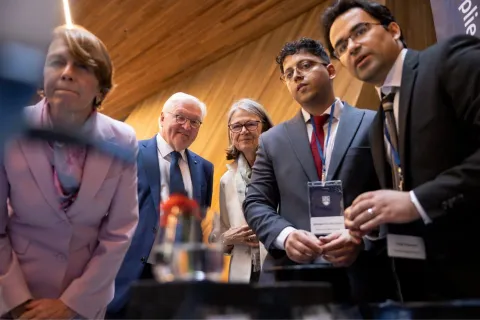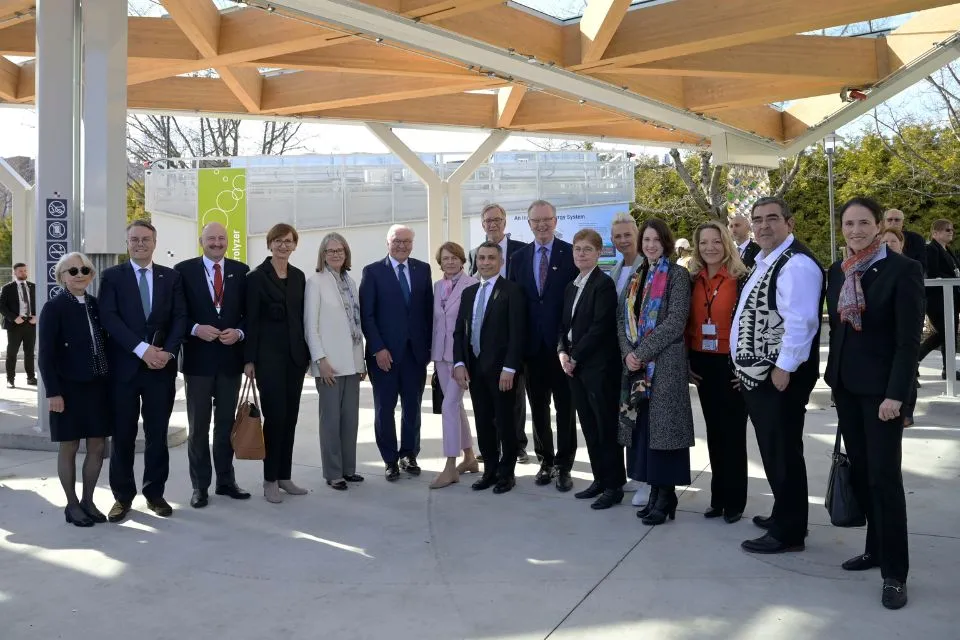German President's visit to UBC highlights clean energy and climate change solutions

The University of British Columbia today hosted Frank-Walter Steinmeier, the President of Germany, as part of his first official visit to Canada.
President Steinmeier toured UBC Faculty of Applied Science’s soon-to-open hydrogen research platform and met researchers working on clean energy and climate change solutions, including engineering experts collaborating with German research institutions.
“We were delighted to welcome President Steinmeier to UBC and to showcase our commitment to sustainable energy and advancing research that addresses climate change,” said UBC President and Vice-Chancellor Dr. Deborah Buszard. “President Steinmeier’s visit underscores the importance of international collaboration in the field of clean energy and we look forward to continued partnership with German institutions.”
“What we saw here during our visit to British Columbia is the close cooperation between science institutions at UBC and in Germany and Canada, and this is encouraging for the future,” said President Steinmeier. “Germany and Canada are working together to make the world a better place and that means changing our daily behaviour and developing innovative technology.”
The 70-member German delegation included the Minister of Education and Research, Bettina Stark-Watzinger, First Lady Elke Büdenbender, German Ambassador to Canada Ms. Sabine Sparwasser, and representatives from parliament, business, science and culture.
They were welcomed by members of the UBC community led by Dr. Walter Mérida, Applied Science Associate Dean, Research and Industrial Partnerships.
President Steinmeier’s visit underscores the importance of international collaboration in the field of clean energy and we look forward to continued partnership with German institutions.
Dr. Mérida noted that UBC is one of the few Canadian academic institutions with research partnerships with the three major German research institutions – Fraunhofer Society, Max Planck Society and Helmholtz Association of German Research Centres, which includes the German Aerospace Centre (DLR).
“UBC Applied Science researchers excel at collaborating across large, multidisciplinary projects that lead to relevant, practical solutions to the complex challenges of climate change and clean energy,” said Dr. Mérida. “This work puts our faculty and students at the heart of what matters most in Canada and the global economy.”
Applied solutions for complex challenges
President Steinmeier’s visit started with a tour of the Smart Hydrogen Energy District (SHED), a unique research platform designed to integrate hydrogen technologies, energy storage and renewable energy generation. The SHED was developed by MéridaLabs, a research group within UBC Applied Science, and is projected to open later this year.
UBC Applied Science researchers excel at collaborating across large, multidisciplinary projects that lead to relevant, practical solutions to the complex challenges of climate change and clean energy.
The German President and delegation members also spoke with researchers working on challenges relating to clean energy, digital manufacturing, quantum materials and smart energy storage. Some of the highlighted projects include:
- Dr. Mohammad Arjmand, Canada Research Chair in advanced materials and polymer engineering, leads a team that is embedding enhanced properties into next-generation nanomaterials for applications that include improving defence capabilities
- A research group led by Dr. David Wilkinson, Canada Research Chair in clean energy and electrochemical technologies, is developing advanced electrochemical methods to produce clean energy and clean water with minimal carbon emissions
- DLR@UBC, a long-term German-UBC collaboration led by Dr. Anoush Poursartip, involves 30-plus scientists working together on eight projects including improving materials and structures for aeronautics and ground transportation
- UBC-Fraunhofer Collaboration on Industrial Digital Transformation, led at UBC by Dr. Yusuf Altintas, are looking to transform industry by digitizing machines, processes and infrastructure
- Researchers at the Max Planck-UBC-UTokyo Centre for Quantum Materials, led at UBC by Dr. Andrea Damascelli, are developing new engineering applications for quantum materials
- UBC Orbit is a satellite design team led by UBC engineering students and advised by electrical and computer engineering professor Dr. David Michelson, who are building a training satellite that can assist in disaster mitigation and response
Canada welcomes several thousand German students every year and the German visit highlights how these students can tap into opportunities to engage in top-tier research, particularly at UBC.
Rafael Haenel, a joint PhD student at UBC, the Max Planck Institute for Solid State Research and the University of Stuttgart, said: “My program gives me the chance to experience a second academic environment. I get to meet interesting people and participate in cutting-edge research and collaboration between two institutes, two cultures.”
President Steinmeier’s official visit to Canada runs April 23-27, with stops in Ottawa, Vancouver and the Arctic.



